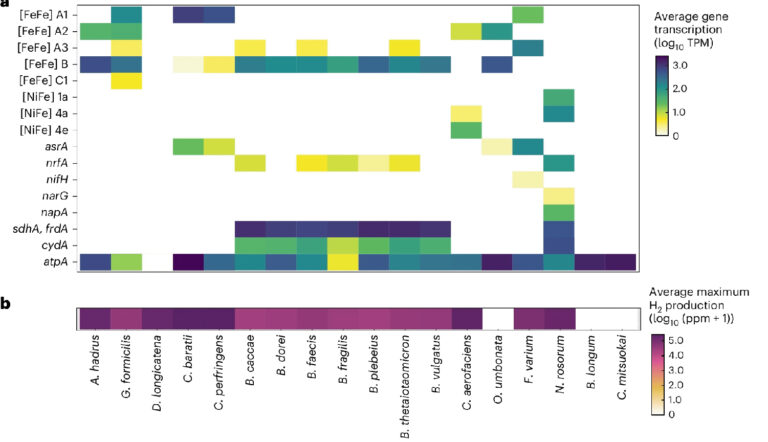Scientists Discover How a Hydrogenase Supports Gut Bacteria in Healthy People
by Anna Sandhu | Oct 24, 2025
Reviewed by Dr. Arun, M.Pharm., PGDRA, Ph.D.

Our gut is home to many tiny bacteria that help break down food our body cannot digest on its own. A new study found that a special enzyme—called a hydrogenase—is very common in these gut bacteria and plays an important role in how they grow and ferment food in healthy people.
What the researchers did
They looked at stool samples, gut bacteria genes, and how active these genes were in healthy adults and people with gut diseases. They found lots of genes for this enzyme type (called group B [FeFe]-hydrogenase) in healthy guts. Then they studied bacteria in the lab to prove the enzyme works to help bacteria ferment food and produce hydrogen gas (which happens when bacteria break down stuff without oxygen).
What they found
- This enzyme (group B [FeFe]-hydrogenase) turned out to be much more common in many gut bacteria than scientists expected.
- The bacteria using this enzyme are often from the group called Bacteroides, which earlier were not thought of as major hydrogen producers.
- When the enzyme was present, the bacteria were better able to ferment food—meaning they break it down into useful bits even in places with little oxygen.
- Interestingly, people with certain gut diseases (like Crohn’s disease) had fewer of these enzyme genes compared to healthy people.
Why this matters
When gut bacteria ferment food, they produce helpful by‐products and gases like hydrogen. These activities influence how our gut works and how well we digest food. If an important enzyme is missing or less active, the gut bacteria may behave differently—and that might link to health issues. Knowing that healthy people’s gut bacteria often have this enzyme helps us understand what a “normal” gut looks like at a microbial level. It may also guide future ideas about making gut health better or helping when things go wrong.
Final takeaway
Think of your gut like a busy kitchen. Many different “chefs” (bacteria) are cooking leftover bits of food. Researchers found a tool—this enzyme—that many of those “chefs” use when cooking in ways that don’t need much air (oxygen). Healthy kitchens seem to have a lot of these tools. When the tool is missing, the cooking (fermentation) might not go the same way—and that could link to gut trouble. This discovery gives scientists another clue about how to keep our gut kitchens working well.
More Information: A widespread hydrogenase supports fermentative growth of gut bacteria in healthy people. DOI: 10.1038/s41564-025-02154-w
